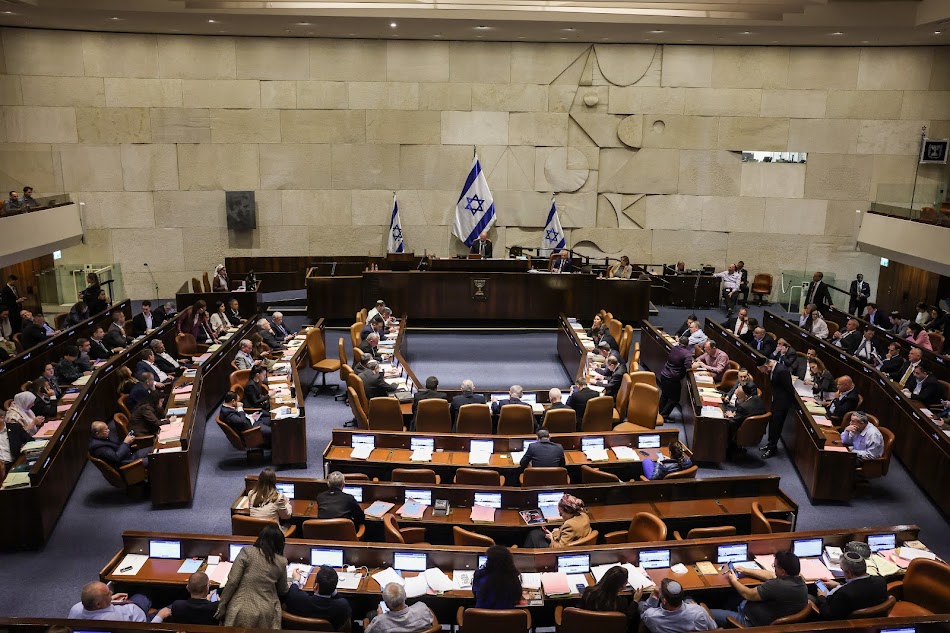
On Wednesday, Israel’s Knesset passed the renewed wartime budget for 2024 with a majority of 62 lawmakers. The new budget increases the planned deficit in light of additional costs brought on by the war.
The updated budget increases spending beyond what was originally agreed to in May 2023 when the budget was passed. The budget newly allocates 70.4 billion shekels ($19.3 billion) in spending, 55 billion ($15 billion) of which are allocated for military spending along with 15.5 billion ($4.1 billion) for civilian spending.
In order to balance the increase in spending, the budget involved significant cuts, including cuts to the Ministry of Education and the Ministry of Agriculture, a 15% cut on Arab sector budgets, a hiring freeze in government offices, and a freeze on new transportation projects. The new budget increases the planned deficit to 6.6% of the gross domestic product, up from an initially planned 2.25%.
Mira Mines, who leads the social services volunteer organization WIZO, said of the new budget: “The budgetary cuts in education and welfare, particularly at this critical moment, hurt the populations who most need support due to the effects of the war.”
Similarly, Becky Cohen-Keshet of the Forum Against Poverty said, “The cuts in the food stamps budget are a fatal blow to hundreds of thousands of families experiencing poverty in Israel.”
Finance Minister Bezalel Smotrich of the far-right Religious Zionist Party said that the goals of the new budget are to win the war, to support the reservists, to strengthen the homefront, and to continue growing the Israeli economy. Prime Minister Benjamin Netanyahu’s Likud party heralded the passage of a budget that “ensures a continuation of the war until decisive victory and is good for the citizens of Israel and the economy of the state.”
Alongside the budget, the Knesset also approved various bills connected to the content of the new budget. The bills included a change in the way social security and health insurance are calculated, reduction of vacation pay, increasing health insurance payments to the National Insurance Institute, and increasing taxes on bank profits. The Knesset also approved a Finance Committee proposal to raise taxes on cigarettes and other smoking products, removing the different tax rate that existed between electronic and non-electronic cigarettes.
Minister of Agriculture Avi Dichter of the Likud party said that he did not support the new budget due to the cuts in his office. He didn’t attend the Knesset plenum, but he later announced that he no longer opposed the budget. “The prime minister answered Minister of Agriculture Avi Dichter’s demands and committed to solving the crisis in the agricultural budget by the Passover holiday of 2024 [in mid-April]. Therefore, Minister Avi Dichter will support the budget,” Dichter’s office said.
Before the vote on the budget was meant to begin, Communications Minister Shlomo Karhi of Likud gave a speech at the Knesset plenum as a means of delaying the vote. This move came in response to Dichter’s threat not to support the budget. Karhi said that Knesset Whip Ofir Katz, also of Likud, requested that he speak. Minister for the Development of the Periphery, the Negev, and the Galilee Yitzhak Wasserlauf also spoke as part of the delay tactic.
Dichter had protested the dramatic cuts to the Ministry of Agriculture, which put the Volcani Center, Israel’s national agriculture research and design institute, at risk of closure. The Ministry of Agriculture expressed hope that the agreements that had been reached with the prime minister would continue to develop. Finance Minister Smotrich said of the discussions, “I have no intention of giving in to interested parties. I call on the prime minister to announce that he has no interested of giving in to political blackmail and to bring the budget to a vote.”
Opposition leader Yair Lapid of the centrist Yesh Atid Party sharply criticized the government over the budget. “You told the working, producing public: the meaning of unity is that you will pay with your money, your businesses, and your lives. What was presented here today isn’t a budget, it’s a bill,” he said. “You screwed up. You destroyed. Now you’re handing us the bill. A deficit is a loan that you are taking from our children and that you have no intention to pay back. You are wasting the money of the middle class Israeli.”
Lapid criticized the budget as spending money wastefully on “meetings, coalition funds, and unnecessary ministries.”
Finance Committee Chair Moshe Gafni of the religious-right United Torah Judaism vowed to address the budget’s cuts to the Arab sector. “The budget for the Arab society will not pass in this form,” he said. “I’ve committed.”
“I am not pleased by a lot of what the Treasury has done. I think that we need to approve this budget and to fight for the things that we have an interest in, and that is what I plan to do,” Gafni added.
Earlier this month, Gafni refused to gather the Finance Committee for a vote on several steps that the Treasury had requested as part of the new budget: the creation of a carbon tax, mandating reporting of income from renters, canceling the tax-free status of cigarettes purchased at duty free, and cuts to the development plan for the Arab sector.






